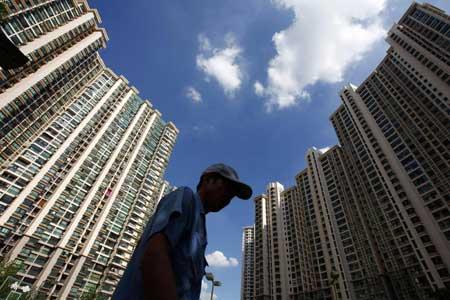
A man passes a housing development in Shanghai on Monday. While China seeks to cool down the property market, it is also tossing a lifeline to the real estate sector through increased spending on affordable housing. Aly Song / Reuters
Continued tightening means sector will face difficult fourth quarter
BEIJING - China's property developers will endure a cold business climate this winter with no let-up in the government's tightening measures, and as housing supply gradually picks up and financing channels are blocked, industry insiders said.
"Based on signals from the central government, the tightening policies will definitely continue in the remaining months of the year, which will put many property developers in a very difficult situation," said Huang Nubo, chairman of Zhongkun Group, a Beijing-based property developer specializing in commercial real estate.
Speaking at a meeting in Changzhou, Jiangsu province, on Saturday, Vice-Premier Li Keqiang called for the smooth implementation of the government's tightening measures.
This is the second time in nine days that Li has made such a point, highlighting the central government's determination to regulate the property market.
Meanwhile, Li pledged that China would complete the construction of 5.8 million affordable homes this year and increase the supply of commercial housing to meet demand.
"These measures indicate that the government will not let its guard down, and the construction of affordable housing will be the policy focus in the next stage of regulation," said Qin Xiaomei, chief researcher with property consultancy Jones Lang LaSalle Beijing.
She estimated that a large number of affordable homes could come on the market within the next year, which would help to redress the current imbalance between supply and demand and thus ease price growth pressures.
Despite the better-than-expected financial performance of the country's leading property developers in the first half of the year, analysts said most of the reported sales were achieved in the second half of last year when the property market was sizzling.
The tightening measures have already had an impact on realtors' sales, said Qin, adding that these effects will continue to be felt for the rest of this year.
Meanwhile, as it is much more difficult for realtors to receive bank loans and get finances from trusts, some of them have been seeking high-cost financing, with interest rates ranging from 12 to 16 percent, compared with the benchmark rate of 5.31 percent for one-year loans.
"Even though some property developers are not encountering cash flow problems in the third quarter, the fourth quarter will be a really difficult period for them as they will evaluate their sales and revenue plans and try to end the year on a robust note," said Qin. "I suggest that property developers cut prices as quickly as possible."
Many realtors have in fact quickened their pricing adjustment to adapt to market changes.
Beijing-based Runfeng Real Estate, for instance, has just cut prices at its project in the south of the city by 10 percent. The effect is self-evident, as 90 percent of the apartments were sold out within a matter of days.
Sino-Ocean Land also plans to put units at its new project in the east of the city on the market 6,000 yuan ($882) lower per square meter than the average in that area, which is 23,000 yuan.





